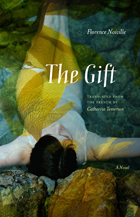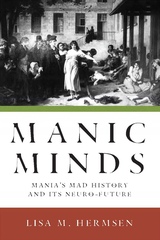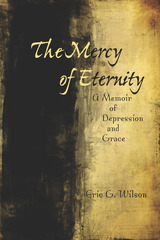3 books about Manic-depressive illness

The Gift
A Novel
Florence Noiville
Northwestern University Press, 2012
This moving fictional memoir begins as a woman heads home after a meeting regarding her inheritance. Rebeling against the legalese uttered by the attorney, her mind drifts back to her childhood and she sees her life with sudden clarity. On the train, she jots down a few notes, which prompt the poetic outpouring of memory and emotion that make up this delicate novel.
The narrator’s mother looms large in her psyche. Labeled “eccentric” or “Italian,” her mother in fact suffered from what was later found to be manic depression. Without understanding the disease, the family treated the unpredictable ups and downs of her condition as they struck. During periods of paralyzing depression she was hospitalized, and the family felt abandoned. During periods of manic productivity and overdrive, she was a dedicated pharmacist, an exemplary homemaker, and an unusually knowledgeable gardener.
This sparse novel draws the portrait of a grand and unforgettable lady, loving and unable to love at once. Her bequest is as much a material one as it is an emotional one, and, the author surmises as she glances at her own daughters, a genetic one.
The narrator’s mother looms large in her psyche. Labeled “eccentric” or “Italian,” her mother in fact suffered from what was later found to be manic depression. Without understanding the disease, the family treated the unpredictable ups and downs of her condition as they struck. During periods of paralyzing depression she was hospitalized, and the family felt abandoned. During periods of manic productivity and overdrive, she was a dedicated pharmacist, an exemplary homemaker, and an unusually knowledgeable gardener.
This sparse novel draws the portrait of a grand and unforgettable lady, loving and unable to love at once. Her bequest is as much a material one as it is an emotional one, and, the author surmises as she glances at her own daughters, a genetic one.
[more]

Manic Minds
Mania's Mad History and Its Neuro-Future
Lisa M. Hermsen
Rutgers University Press, 2012
From its first depictions in ancient medical literature to contemporary depictions in brain imaging, mania has been largely associated with its Greek roots, "to rage." Prior to the nineteenth century, "mania" was used interchangeably with "madness." Although its meanings shifted over time, the word remained layered with the type of madness first-century writers described: rage, fury, frenzy. Even now, the mental illness we know as bipolar disorder describes conditions of extreme irritability, inflated grandiosity, and excessive impulsivity.
Spanning several centuries, Manic Minds traces the multiple ways in which the word "mania" has been used by popular, medical, and academic writers. It reveals why the rhetorical history of the word is key to appreciating descriptions and meanings of the "manic" episode." Lisa M. Hermsen examines the way medical professionals analyzed the manic condition during the nineteenth and twentieth centuries and offers the first in-depth analysis of contemporary manic autobiographies: bipolar figures who have written from within the illness itself.
Spanning several centuries, Manic Minds traces the multiple ways in which the word "mania" has been used by popular, medical, and academic writers. It reveals why the rhetorical history of the word is key to appreciating descriptions and meanings of the "manic" episode." Lisa M. Hermsen examines the way medical professionals analyzed the manic condition during the nineteenth and twentieth centuries and offers the first in-depth analysis of contemporary manic autobiographies: bipolar figures who have written from within the illness itself.
[more]

The Mercy of Eternity
A Memoir of Depression and Grace
Eric G. Wilson
Northwestern University Press, 2010
In his best-selling book Against Happiness: In Praise of Melancholy, Eric G. Wilson challenged our culture’s blindly insistent pursuit of happiness at all costs. In his harrowing yet ultimately hopeful memoir, The Mercy of Eternity, the author turns an unsparing eye on his own continuing struggle with bipolar depression and finds, within the very illness that causes so much suffering, the resources for hope, forgiveness, and love.
As a bright student-athlete on his way to West Point, Eric Wilson seemed to be well on the way to a fulfilling life. Yet he was haunted by overwhelming feelings of his deep insignificance. As he grew older, the traditional means of fulfillment—marriage and professional success—did nothing to assuage the descents into darkness and destructive behavior. Therapy and medication have offered some relief, but the birth of his daughter ultimately forces his hand. In some ways, the answer has been in front of him the whole time, for English professor Wilson finds in the literature of Coleridge, Blake, and others the lessons that depression might teach. When he comes upon “negative theology”—the school of thought that finds God in the “dark night of the soul”—Wilson discovers the framework for a radical call to forgive depression.
Only by forgiving this capricious, impersonal force is Wilson able to find the grace to move beyond the cycles of destructive self-absorption.Wilson admits that he continues to struggle, but in facing his depression instead of trying to escape it, he finds wisdom and grace.
Beautifully and accessibly written, The Mercy of Eternity is a brief yet profound meditation on the largest question of life.
As a bright student-athlete on his way to West Point, Eric Wilson seemed to be well on the way to a fulfilling life. Yet he was haunted by overwhelming feelings of his deep insignificance. As he grew older, the traditional means of fulfillment—marriage and professional success—did nothing to assuage the descents into darkness and destructive behavior. Therapy and medication have offered some relief, but the birth of his daughter ultimately forces his hand. In some ways, the answer has been in front of him the whole time, for English professor Wilson finds in the literature of Coleridge, Blake, and others the lessons that depression might teach. When he comes upon “negative theology”—the school of thought that finds God in the “dark night of the soul”—Wilson discovers the framework for a radical call to forgive depression.
Only by forgiving this capricious, impersonal force is Wilson able to find the grace to move beyond the cycles of destructive self-absorption.Wilson admits that he continues to struggle, but in facing his depression instead of trying to escape it, he finds wisdom and grace.
Beautifully and accessibly written, The Mercy of Eternity is a brief yet profound meditation on the largest question of life.
[more]
READERS
Browse our collection.
PUBLISHERS
See BiblioVault's publisher services.
STUDENT SERVICES
Files for college accessibility offices.
UChicago Accessibility Resources
home | accessibility | search | about | contact us
BiblioVault ® 2001 - 2025
The University of Chicago Press









